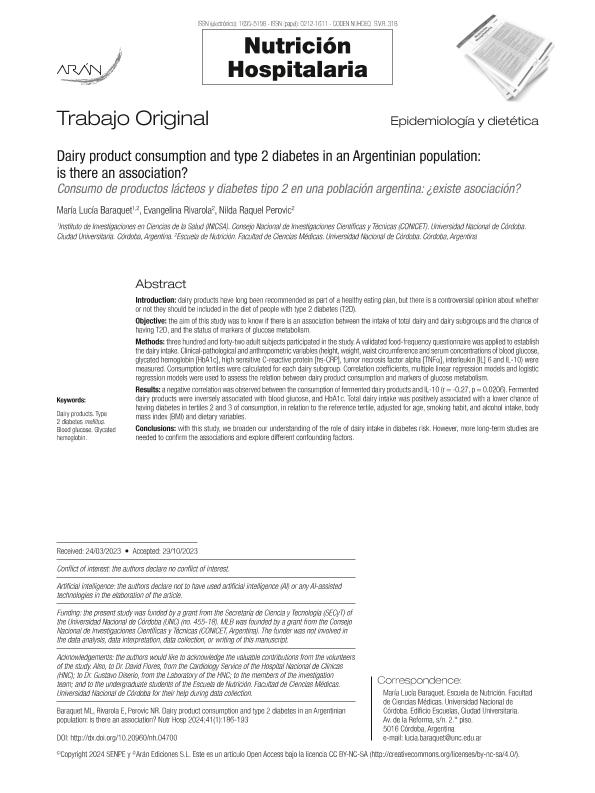Artículo
Introduction: dairy products have long been recommended as part of a healthy eating plan, but there is a controversial opinion about whether or not they should be included in the diet of people with type 2 diabetes (T2D). Objective: the aim of this study was to know if there is an association between the intake of total dairy and dairy subgroups and the chance of having T2D, and the status of markers of glucose metabolism. Methods: three hundred and forty-two adult subjects participated in the study. A validated food-frequency questionnaire was applied to establish the dairy intake. Clinical-pathological and anthropometric variables (height, weight, waist circumference and serum concentrations of blood glucose, glycated hemoglobin [HbA1c], high sensitive C-reactive protein [hs-CRP], tumor necrosis factor alpha [TNFα], interleukin [IL] 6 and IL-10) were measured. Consumption tertiles were calculated for each dairy subgroup. Correlation coefficients, multiple linear regression models and logistic regression models were used to assess the relation between dairy product consumption and markers of glucose metabolism. Results: a negative correlation was observed between the consumption of fermented dairy products and IL-10 (r = -0.27, p = 0.0206). Fermented dairy products were inversely associated with blood glucose, and HbA1c. Total dairy intake was positively associated with a lower chance of having diabetes in tertiles 2 and 3 of consumption, in relation to the reference tertile, adjusted for age, smoking habit, and alcohol intake, body mass index (BMI) and dietary variables. Conclusions: with this study, we broaden our understanding of the role of dairy intake in diabetes risk. However, more long-term studies are needed to confirm the associations and explore different confounding factors. Introducción: los lácteos se han recomendado durante mucho tiempo como parte de un plan de alimentación saludable, pero existen opiniones controvertidas sobre si deben incluirse en la dieta de las personas con diabetes tipo 2 (DT2). Objetivo: el objetivo fue conocer si existe asociación entre la ingesta de lácteos totales y subgrupos lácteos y la posibilidad de tener DT2, y el estado de los marcadores del metabolismo de la glucosa. Métodos: participaron 342 sujetos adultos. Se aplicó un cuestionario de frecuencia de consumo para establecer el consumo de lácteos. Se midieron variables clínicas-patológicas y antropométricas (talla, peso, circunferencia de cintura y concentraciones séricas de glucosa en sangre, hemoglobina glicosilada [HbA1c], proteína C reactiva ultrasensible [PCR-us], factor de necrosis tumoral alfa [TNFα], interleuquina [IL] 6 e IL-10). Se calcularon terciles de consumo para cada subgrupo de lácteos. Se utilizaron coeficientes de correlación, modelos de regresión lineal múltiple y regresión logística para evaluar la relación entre el consumo de lácteos y los marcadores del metabolismo de la glucosa. Resultados: los productos lácteos fermentados se asociaron inversamente con la glucosa en sangre y la HbA1c. La ingesta total de lácteos se asoció positivamente con una menor probabilidad de tener diabetes en los terciles 2 y 3 de consumo, en comparación con el tercil de referencia, ajustado por edad, tabaquismo, ingesta de alcohol, índice de masa corporal (IMC) y variables dietéticas. Conclusiones: con este estudio, ampliamos nuestra comprensión del papel de la ingesta de lácteos en el riesgo de diabetes. Sin embargo, se necesitan más estudios a largo plazo para confirmar las asociaciones y explorar diferentes factores de confusión.
Dairy product consumption and type 2 diabetes in an Argentinian population: Is there an association?
Título:
Consumo de productos lácteos y diabetes tipo 2 en una población argentina: ¿Existe asociación?
Fecha de publicación:
12/2023
Editorial:
Aula Médica Ediciones
Revista:
Nutrición Hospitalaria
ISSN:
0212-1611
e-ISSN:
1699-5198
Idioma:
Inglés
Tipo de recurso:
Artículo publicado
Clasificación temática:
Resumen
Palabras clave:
Dairy products
,
Type 2 diabetes mellitus
,
Blood glucose
,
Glycated hemoglobin
Archivos asociados
Licencia
Identificadores
Colecciones
Articulos(INICSA)
Articulos de INSTITUTO DE INVESTIGACIONES EN CIENCIAS DE LA SALUD
Articulos de INSTITUTO DE INVESTIGACIONES EN CIENCIAS DE LA SALUD
Citación
Baraquet, María Lucía; Rivarola, Evangelina; Perovic, Nilda Raquel; Dairy product consumption and type 2 diabetes in an Argentinian population: Is there an association? ; Aula Médica Ediciones; Nutrición Hospitalaria; 41; 1; 12-2023; 186-193
Compartir
Altmétricas




